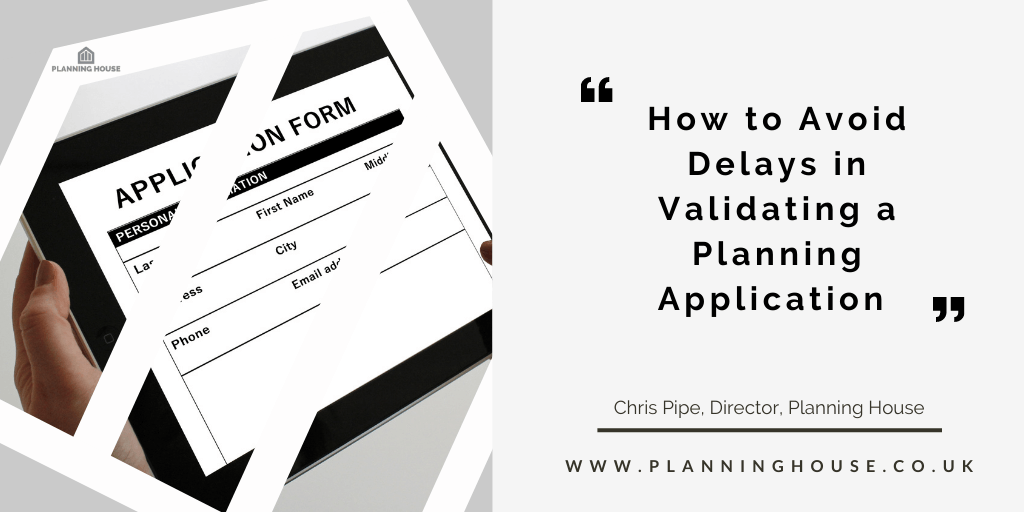The process of validating a planning application is undertaken by the Council to check that new planning applications are complete and include all relevant supporting information.
Before an application is considered by a Planning Officer it must go through the Council’s internal validation process. Once submitted a planning application must be deemed as valid before the application process commences. Which means that all the information specified by the Council in order to determine the application should be provided at the start of the process. If the correct fee or relevant information is missing the Council will not be able to start determining the application and the planning process will be delayed. Poor quality information may also cause delay.
What is required for validation?
There are National and Local requirements for each type of application. Applicants are encouraged to submit applications electronically, the Planning Portal contains relevant forms and guidance.
Some planning applications require more detailed information than others, and some information required can be complex and technical. It is required so that Council officers (not just in Planning) and technical external consultees can assess what the impacts the development will be on the area, neighbours etc, for example regarding the amount of traffic generated by a proposal, or the impact of the proposal on wildlife. The information also helps the general public understand your proposals.
All applications must be accompanied by the relevant form, plans and correct fee, however there are also some other reports required depending on your proposal, for example a Design and Access Statement depending on the scale and location of your proposal. A Heritage Statement, if there is a potential impact on a heritage asset, for example listed building, or if your site is within a conservation area or if there is a known archaeological interest etc. Also, if the planning issues associated with your proposal are complex a separate planning statement may be required highlighting case law and dealing with the planning issues.
Additional Information
When there are trees on the site a tree survey is generally required, as trees often affect a development layout it is advisable that a survey is carried out in advance of formulating plans.
Biodiversity has fast become a hot topic and surveys are sometimes required, for example, if your site is near a pond where there could be Great Crested Newts or if there is an old building on the site or the proposal includes the remove trees which could contain bats. Or to demonstrate a biodiversity net gain with a proposed development. Be aware that some surveys can only be done at certain times of the year so don’t be caught out as this can often set your development back by months. Take a look at our Ecological Survey & Mitigation Timetable.
There are many other supporting documents that a Council can request, these are contained on the Council’s Local List for Validation, which are generally published on the Council’s website and should be reviewed every few years.
Some of the documents/surveys required can be quite technical and you will need specialist help. If you don’t have a planning consultant instructed who can advise on specialists and arrange for the relevant work to be carried out you can look through the Council’s planning application records to find examples of reports within the area and contact the consultants who prepared them. However, compare prices as these specialist reports can vary widely.
The table below highlights potential information which may be required, please note this list is not exhaustive so always check with the relevant Local Planning Authority:
National Requirements – mandatory for all applications
- Application Form
- Design and Access Statement (for some applications)
- Location Plan
- Ownership Certificates & Agricultural Declaration
- The Appropriate Fee
Examples of additional information depending on development specifics
Additional Plans and Drawings
- Agricultural Land Classification Statement
- Air Quality Assessment
- Biodiversity and Geology Survey and Report
- Building for Life Assessment
- Coal Mining Risk Assessment
- Construction Management Plan
- Environmental Statement
- Flood Risk Assessment
- Heritage Statement
- Land Contamination Assessment
- Lighting Assessment
- Meeting Housing Needs Statement
- Minerals and Waste Safeguarding Assessment
- Noise Assessment
- Open Space, Sport, Play and Leisure Assessment
- Planning Statement
- Sequential Test & Impact Assessment for Town Centre Uses
- Structural Survey
- Surface Water Management Assessment & Flood Risk Assessment
- Telecommunications Assessment
- Transport Assessment
- Transport Statement
- Travel Plan
- Tree Assessment
- Ventilation/Extraction Statement
- Viability Assessment
- Visual Impact Assessment (Townscape/Landscape)
How long does validation take?
Applications should be validated as soon as practicable to allow the formal process of publicising and consulting on the application to begin. In theory the process should take up to 5 days to process, however with ever stretched resources Councils often take longer. And unfortunately some Councils invalidate application for the slightest error or missing piece of information in a bid to delay the start date, which isn’t helpful.
What happens if a Local Planning Authority does not validate my planning application?
If a Local Planning Authority considers there is insufficient information provided and invalidates your application, they will inform you and allow you to provide the relevant information.
There is a procedure available to applicants when there is a dispute in validation requirements under article 12 of the Town and Country Planning (Development Management Procedure) (England) Order 2015.
Related Content
With increasing pressure Councils are becoming increasingly strict in terms of their validation process, don’t underestimate the delays that could be incurred by validation.
We’ve published a series of eBooks and Practical Guides along with regular blogs on town planning topics to ensure that you’ve got the basics of the Town Planning system covered. Feel free to take a look through our website, and if you do need some assistance with your development proposal, CONTACT US.


